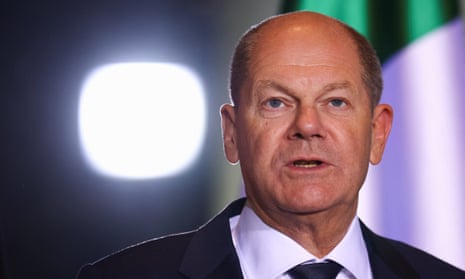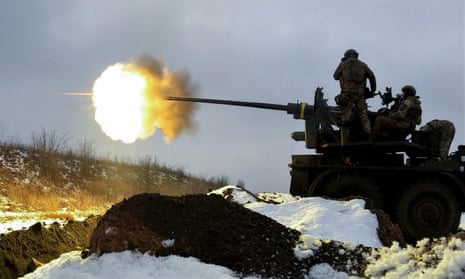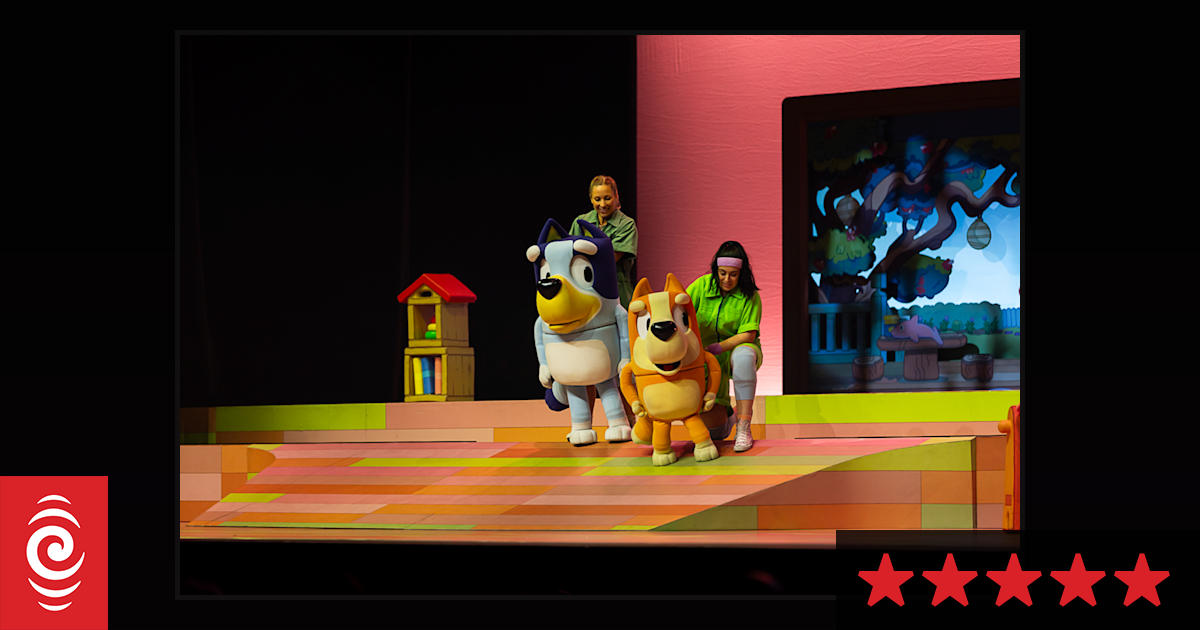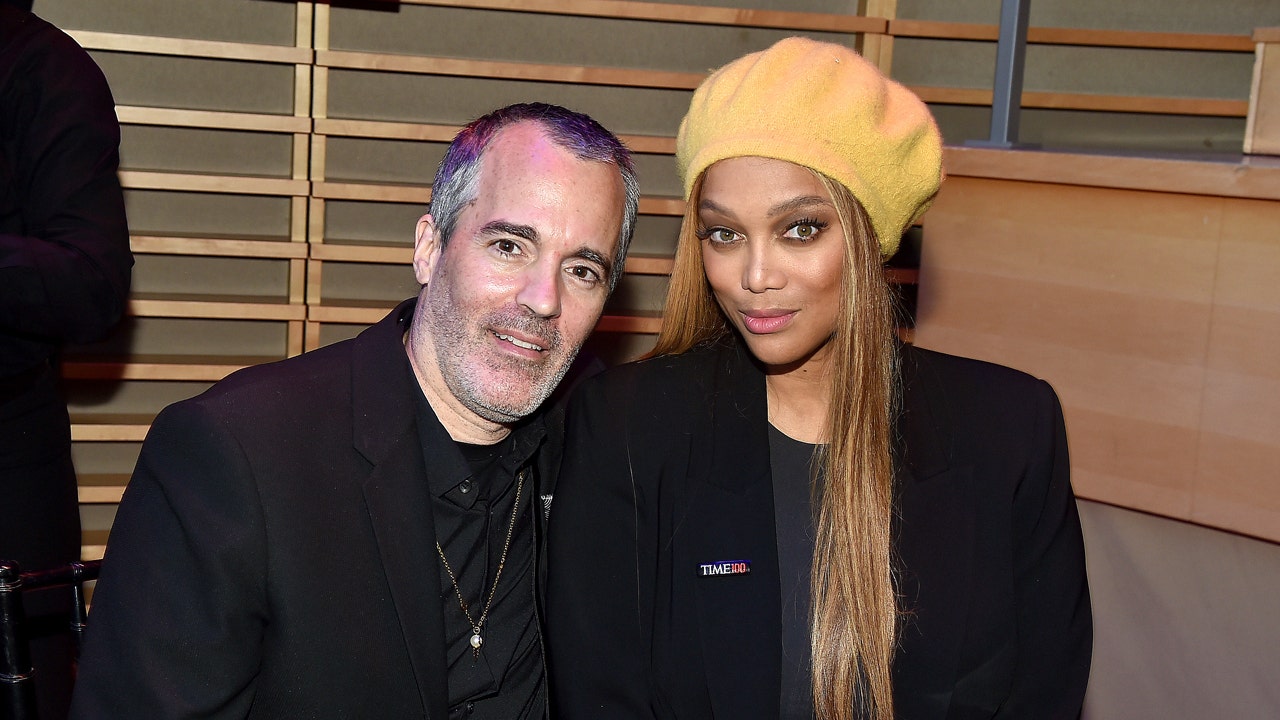Situation on eastern frontlines ‘very difficult now’, Zelenskiy says
The Ukrainian president, Volodymyr Zelenskiy, said on Saturday the situation on the frontlines in the east of the country was getting tougher and Russia was throwing more and more troops into battle.
The Kremlin has been pushing for a significant battlefield victory after months of setbacks, with Russian forces trying to close grip on the town of Bakhmut and fighting for control of a nearby major supply route for Ukrainian forces.
Russian troops are also trying to capture the coal mining city of Vuhledar, about 75 miles (120km) south-west of Bakhmut, in the eastern region of Donetsk.
“I’ve often had to say the situation at the front is tough, and is getting tougher, and it’s that time again … The invader is putting more and more of his forces into breaking down our defences,” Zelenskiy said in his nightly video address.
“It is very difficult now in Bakhmut, Vuhledar, Lyman and other directions,” he continued.
Earlier in the day, the deputy defence minister, Hanna Malyar, wrote on Telegram that Russian efforts to break the defences in Bakhmut and Lyman had failed.
Lyman, which lies just to the north of Bakhmut, was liberated by Ukrainian forces in October.
“This week, the Russian occupation forces threw all their efforts into breaking through our defence and encircling Bakhmut, and launched a powerful offensive in the Lyman sector,” Malyar said. “But thanks to the resilience of our soldiers, they did not succeed.”
On Friday, Zelenskiy vowed that his forces will fight for Bakhmut “for as long as we can”, but the situation there is becoming increasingly dire for Ukrainian forces.
The general staff of Ukraine’s armed forces has been reporting daily numerous combat clashes in the area and Moscow military bloggers have claimed a number of unverified Russian successes along the frontline.
Key events
Helping to arm Ukraine so it can defend itself against Russia is the swiftest path to achieving peace, British foreign secretary James Cleverly said in an article published on Sunday.
Writing in the Times of Malta ahead of a visit on Tuesday to the Mediterranean island, which assumed the presidency of the U.N. Security Council at the start of February, Cleverly wrote:
Like all authoritarian rulers, Putin responds only to strength in his opponents. He rejected Volodymyr Zelenskiy’s 10-point plan for peace last December. That is why the UK and Ukraine’s friends are doing all they can to bring Ukraine success on the battlefield. And it’s why I’m delighted that Germany and the US are joining the UK in sending tanks to the Ukrainians. Giving the Ukrainians the tools they need to finish the job is the swiftest – indeed the only – path to peace.
The war in Ukraine is expected to dominate the talks between Britain and Malta, a European Union member.
Russian attacks were reported in seven out of Ukraine’s 25 regions over Feb. 4, hitting Dnipropetrovsk, Donetsk, Luhansk, Kharkiv, Kherson, Mykolaiv, and Zaporizhzhia oblasts with artillery and missiles.
According to the regional governors and officials, at least five civilians were killed and 12 injured, the Kyiv Independent reports.
Ukraine’s president, Volodymyr Zelenskiy, has revoked the citizenship of several former influential politicians.
“Today, I signed the relevant documents to take another step to protect and cleanse our state from those on the side of the aggressor,” Zelenskiy said during his nightly video address on Saturday.
He would not list the names but said they had dual Russian citizenship.
According to Ukrainian state media, the list includes several top politicians from the office of Viktor Yanukovych, who served as Ukraine’s pro-Russian president from 2010 until he was removed from office in 2014.
The list included Dmytro Tabachnyk, a former minister of education and science, Andriy Klyuyev, a former deputy prime minister and head of Yanukovych’s administration, and Vitaliy Zakharchenko, a former interior minister, the RBC-Ukraine news agency reported.
Ukraine has stripped a number of people of their Ukrainian citizenship and has sanctioned hundreds of Russian and Belarusian individuals and firms since the start of the Russian invasion a year ago.
The head of Russia’s private Wagner militia said on Sunday that fierce fighting was ongoing in the northern parts of the Ukrainian city of Bakhmut, which has been the focus of Russian forces’ attention for weeks.
Yevgeniy Prigozhin, the founder and head of the Wagner group, said Ukrainian forces were not retreating. Reuters reports.
Russian forces have been attempting to encircle and capture Bakhmut, a city in the eastern Donbas region, for weeks.
Prigozhin rejected reports in Russian media outlets that Ukrainian troops were abandoning Bakhmut. “Ukrainian forces are not retreating anywhere. They are fighting to the last,” he said in a statement published on his Telegram channel.
“Fierce battles are going on in the northern quarters for every street, every house, every stairwell,” he added.
Ukrainian President Volodymyr Zelenskiy has said repeatedly in recent days that the situation around the city is tough.
Bakhmut has become “increasingly isolated”, according to the latest assessment by the UK Ministry of Defence.
On Friday, Zelenskiy vowed that his forces will fight for Bakhmut “for as long as we can”, but the situation there is becoming increasingly dire for Ukrainian forces.
If Russian forces manage to capture the city, which has been decimated by months of artillery shelling, it would be their most important strategic advance since last summer.
A former Israeli prime minister who served briefly as a mediator at the start of Russia’s war with Ukraine says he drew a promise from the Russian president not to kill his Ukrainian counterpart
Associated Press agency reports:
Former Prime Minister Naftali Bennett became an unlikely intermediary in the war’s first weeks, becoming one of the few Western leaders to meet President Vladimir Putin during the war in a snap trip to Moscow last March.
While Bennett’s mediation efforts appear to have done little to end the bloodshed that continues until today, his remarks, in an interview posted online late Saturday, shed light on the backroom diplomacy and urgent efforts that were underway to try to bring the conflict to a speedy conclusion in its early days.
In the five-hour interview, which touched on numerous other subjects, Bennett says he asked Putin about whether he intended to kill Ukrainian President Volodymyr Zelenskiy
“I asked ‘what’s up with this? Are you planning to kill Zelenskiy?’ He said ‘I won’t kill Zelenskiy.’ I then said to him ‘I have to understand that you’re giving me your word that you won’t kill Zelenskiy.’ He said ‘I’m not going to kill Zelenskiy.’”
Bennett said he then called Zelenskiy to inform him of Putin’s pledge.
“‘Listen, I came out of a meeting, he’s not going to kill you.’ He asks, ‘are you sure?’ I said ’100% he won’t kill you.’”
Bennett said that during his mediation, Putin dropped his vow to seek Ukraine’s disarmament and Zelenskiy promised not to join NATO.
Bennet’s peacemaking efforts did not appear to take off and his time in power was short-lived, reports AP.
‘Putin did not threaten me or Germany,’ says Scholz
In the interview with Bild am Sonntag, Olaf Scholz said Vladimir Putin “has not made any threats against me or Germany” in his telephone conversations with the Russian president.
Former British prime minister Boris Johnson, speaking to the BBC for a documentary early this week, said the Russian leader had threatened him with a missile strike that would “only take a minute.” The Kremlin said Johnson was lying.
The German chancellor said the conversations he had with Putin made it clear they had very different views of the war in Ukraine, which Russia calls a “special military operation”.
“I make it very clear to Putin that Russia has sole responsibility for the war,” Scholz said.
“Russia has invaded its neighbour for no reason, in order to take parts of Ukraine or the whole country under its control.”
Because it was Germany’s view that Russia’s actions violated Europe’s peace framework, it was providing Ukraine with financial, humanitarian and military help, he said.
Germany’s chancellor, Olaf Scholz, has said Ukraine’s president agreed that weapons supplied by the west will not be used to attack Russian territory.
“There is a consensus on this point,” Scholz said in an interview with the weekly Bild am Sonntag.
Ukraine’s western allies have pledged to arm it with precision rockets and missile systems, as well as tanks, as it tries to push back Russian troops in its east.
The Russian president, Vladimir Putin, has compared the intervention of countries such as Germany with his nation’s struggle during the second world war.
But Scholz rejected the comparison.
“[Putin’s] words are part of a series of absurd historical comparisons that he uses to justify his attack on Ukraine,” he said. “But nothing justifies this war.
“Together with our allies, we are supplying battle tanks to Ukraine so that it can defend itself. We have carefully weighed each delivery of weapons, in close coordination with our allies, starting with America.”
Scholz said that such a consensus-based approach “avoids an escalation”.

Ukrainian forces remained in control of the village of Bilohorivka, the Luhansk region governor, Serhiy Haidai, has said, adding that the situation there is tense, but under control.
“Information is being spread in the Russian Federation about the alleged capture of Bilohorivka and the removal of our people from there,” Haidai told the national broadcaster on Sunday.
“Our troops remain in their positions, nobody has captured Bilohorivka, nobody has entered there, there is no enemy there.”
Some Moscow-installed officials and pro-Russian military bloggers have recently claimed Russian advances in the direction of Bilohorivka, the last part of Luhansk – the northern part of the Donbas – held by Ukrainian forces.
“The situation at the front is tense, but controlled by Ukrainian forces,” Haidai said.
“The number of Russian attacks has … increased, but all of them have been repulsed by our troops, who remain in their positions.”
Reuters was not able to independently verify the report.
The embattled eastern Ukrainian town of Bakhmut has become “increasingly isolated”, according to the latest assessment by the UK Ministry of Defence.
“Over the last week, Russia has continued to make small advances in its attempt to encircle the Donbas town of Bakhmut,” the MoD tweeted on Sunday.
“The M03 and the H32 – the two main roads into the city for Ukrainian defenders – are likely now both threatened by direct fire, following the Russian advances.
“Earlier in the week, Wagner paramilitary forces highly likely seized a subordinate route which links Bakhmut to the town of Siversk.
“While multiple alternative cross-country supply routes remain available to Ukrainian forces, Bakhmut is increasingly isolated.”
Russian missile hits residential building in Kharkiv
Two Russian missiles hit the centre of Kharkiv in Ukraine’s north-east, with one of the missiles striking a residential building, Reuters reported the city’s mayor saying on Sunday.
“At this time, it’s known that there is a fire in one of the residential buildings and one injured person,” Ihor Terekhov said on the Telegram messaging platform.
The Kharkiv governor, Oleh Synehubov, said: ““A residential building in the city centre was hit. A fire broke out. So far, three victims are known: a 54-year-old woman and two men aged 51 and 55.”
He said the woman was hospitalised with shrapnel wounds.
Reuters was not able to independently verify the report.
Situation on eastern frontlines ‘very difficult now’, Zelenskiy says
The Ukrainian president, Volodymyr Zelenskiy, said on Saturday the situation on the frontlines in the east of the country was getting tougher and Russia was throwing more and more troops into battle.
The Kremlin has been pushing for a significant battlefield victory after months of setbacks, with Russian forces trying to close grip on the town of Bakhmut and fighting for control of a nearby major supply route for Ukrainian forces.
Russian troops are also trying to capture the coal mining city of Vuhledar, about 75 miles (120km) south-west of Bakhmut, in the eastern region of Donetsk.
“I’ve often had to say the situation at the front is tough, and is getting tougher, and it’s that time again … The invader is putting more and more of his forces into breaking down our defences,” Zelenskiy said in his nightly video address.
“It is very difficult now in Bakhmut, Vuhledar, Lyman and other directions,” he continued.

Earlier in the day, the deputy defence minister, Hanna Malyar, wrote on Telegram that Russian efforts to break the defences in Bakhmut and Lyman had failed.
Lyman, which lies just to the north of Bakhmut, was liberated by Ukrainian forces in October.
“This week, the Russian occupation forces threw all their efforts into breaking through our defence and encircling Bakhmut, and launched a powerful offensive in the Lyman sector,” Malyar said. “But thanks to the resilience of our soldiers, they did not succeed.”
On Friday, Zelenskiy vowed that his forces will fight for Bakhmut “for as long as we can”, but the situation there is becoming increasingly dire for Ukrainian forces.
The general staff of Ukraine’s armed forces has been reporting daily numerous combat clashes in the area and Moscow military bloggers have claimed a number of unverified Russian successes along the frontline.
Opening summary
Hello and welcome back to the Guardian’s ongoing live coverage of Russia’s war in Ukraine.
The Ukrainian president, Volodymyr Zelenskiy, has said the situation on the frontlines in the east of the country was getting tougher and Russia was throwing more and more troops into battle.
“I’ve often had to say the situation at the front is tough, and is getting tougher, and it’s that time again … The invader is putting more and more of his forces into breaking down our defences,” Zelenskiy said in his nightly video address on Saturday.
“It is very difficult now in Bakhmut, Vuhledar, Lyman and other directions,” he continued.
The Kremlin has been pushing for a significant battlefield victory after months of setbacks, with Russian forces trying to close grip on the town of Bakhmut and fighting for control of a nearby major supply route for Ukrainian forces.
More on that story soon.
In other developments:
-
The German chancellor, Olaf Scholz, said Zelenskiy has agreed that weapons supplied by the west will not be used to attack Russian territory. “There is a consensus on this point,” Scholz told Bild am Sonntag. Scholz rejected Vladimir Putin’s comparison of the intervention of the west with Russia’s struggle during the second world war as “absurd”. “We have carefully weighed each delivery of weapons, in close coordination with our allies, starting with America,” he said, adding that such a consensus-based approach “avoids an escalation”.
-
The Ukrainian president has revoked the citizenship of several former influential politicians, in what he said was another step to “cleanse” the country of pro-Russian influences. Zelenskiy would not list the names, but said they had dual Russian citizenship. According to Ukrainian state media, the list includes several top politicians from the office of Viktor Yanukovych, who served as Ukraine’s pro-Russian president from 2010 until he was removed from office in 2014.
-
Portugal has become the latest country to say it will send Leopard 2 tanks to Ukraine, the prime minister, António Costa, said. An inventory has been done of its stocks, with Lisbon asking Germany for parts to help repair them so they can be deployed to Ukraine.
-
Zelenskiy spoke to UK prime minister, Rishi Sunak, on Saturday. The president said he had thanked Sunak for the training of Ukrainian troops so they will be able to use British Challenger tanks.
-
The US attorney general, Merrick Garland, has authorised the country to begin using seized Russian money to aid Ukraine, according to US media. The money would come from assets confiscated from Russian oligarch Konstantin Malofeyev after his April indictment for alleged sanctions evasions, he added.
-
Ukraine has introduced emergency energy shutdowns in Odesa after a “technological accident” at a high-voltage electricity substation, which has previously been damaged by Russian attacks. Half a million people are without power and officials have warned repairs could take weeks. The government said it would appeal to Turkey for help and ordered the energy ministry’s stocks of high-power generators to be sent to the city.
-
Germany has collected evidence of war crimes in Ukraine, the country’s prosecutor general said in a newspaper interview published on Saturday, adding that he saw a need for a judicial process at international level. He said the amount of evidence was in the “three-digit” range.
-
More than 18.1m border crossings have taken place out of Ukraine since Russia’s invasion began in February 2022, according to data from the UN.
-
The bodies of killed British volunteers Christopher Parry and Andrew Bagshaw have been returned by Russian troops in a prisoner exchange. They were both killed in Ukraine last month. A total of 116 Ukrainian troops have come home after being captured, with 63 being sent back to Russia.
-
The number of Russian soldiers around the southern city of Mariupol has increased by about 10,000 to 15,000, according to an adviser to the city’s mayor. Petro Andriushchenko wrote on Telegram that it means the total amount of troops is now about 30,000. They are stationed in villages in the district.

















 #pushpa2
#pushpa2

Discussion about this post